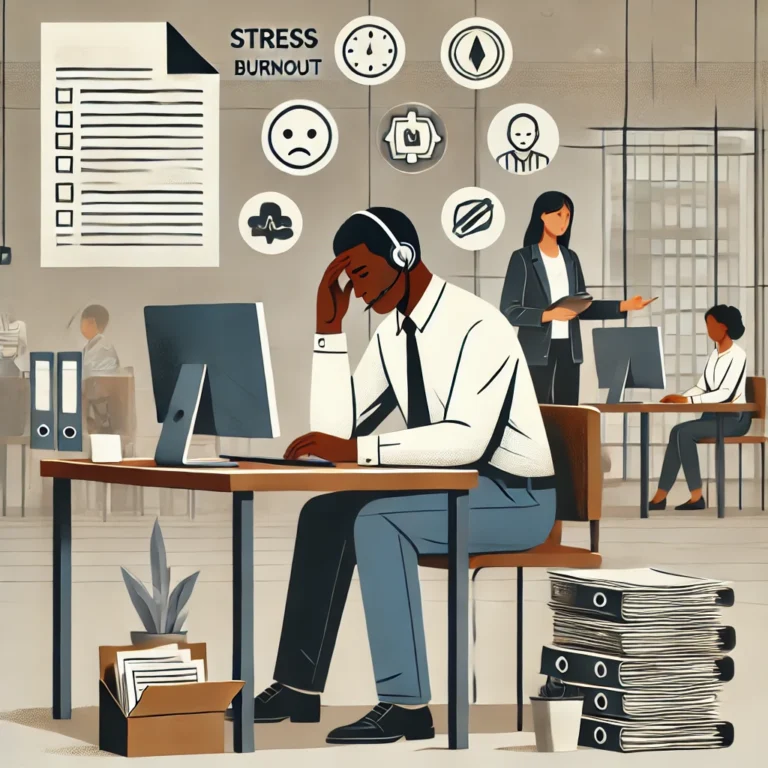The theme for 2024 World Mental Health Day is, ‘It is Time to Prioritise Mental Health in the Workplace’. The day is celebrated annually on October 10.
In Nigeria’s fast-paced corporate environment, stress and burnout are becoming more prevalent, and their effects on workplace productivity cannot be overstated. Professionals across various industries face significant pressures, including long working hours, high performance expectations, and economic instability, which all contribute to declining mental well-being.
This issue has far-reaching consequences, not only on employees but also on the corporations that employ them. Understanding the relationship between workplace stress, burnout, and productivity is crucial to improving employee health and enhancing organizational performance.
The Growing Challenge of Workplace Stress
Workplace stress is on the rise globally, and Nigeria is no exception. The 2022 Africa Workplace Stress Report, conducted by an HR consultancy firm, found that over 70% of Nigerian professionals experience moderate to high levels of stress in their jobs. This stress often stems from the competitive nature of corporate environments, where employees are expected to meet tight deadlines, handle heavy workloads, and constantly strive for better performance.
Moreover, the country’s volatile economic conditions—characterized by inflation, fluctuating oil prices, and high unemployment rates—add to the pressure. Employees often work in fear of losing their jobs or face the stress of juggling multiple jobs to make ends meet. This mounting pressure creates an environment ripe for burnout, which is now a leading mental health issue in the Nigerian workplace.
Burnout, defined by the World Health Organization (WHO) as chronic workplace stress that has not been successfully managed, can manifest in feelings of exhaustion, negativity toward one’s job, and a reduction in professional efficacy. In a recent survey conducted by Nigeria’s National Health Insurance Scheme (NHIS), 56% of Nigerian workers reported feeling “completely burned out” by their work, with many citing an inability to balance work and personal life as a primary contributor.
Impact on Productivity
The link between mental health challenges and productivity losses is undeniable. Research shows that stress and burnout lead to increased absenteeism, presenteeism (being physically present but mentally unengaged), and employee turnover—all of which impact a company’s bottom line. According to a 2023 study by Lagos Business School, Nigerian corporations are losing an estimated ₦3 trillion annually due to decreased productivity resulting from poor mental health among employees.
Absenteeism caused by mental health issues, such as stress-related illnesses and burnout, has become a common occurrence in Nigerian workplaces. In sectors like banking, telecommunications, and oil and gas—where stress levels are particularly high—employers report that employees frequently call in sick due to mental health strains. Presenteeism, while less visible, is another significant concern. Employees may come to work despite being mentally exhausted, but their performance suffers as they struggle to focus, meet deadlines, and maintain the quality of their work. This hidden loss in productivity is a major challenge for businesses seeking to maintain a competitive edge.
The Role of Corporate Mental Health Policies
Given the substantial impact of mental health on employee productivity, more Nigerian companies are beginning to recognise the importance of mental health policies. However, corporate efforts to address mental health challenges remain uneven across industries. While large multinational corporations are leading the way by incorporating mental health services into their employee wellness programs, smaller Nigerian companies often lag behind due to limited resources or awareness of the issue.
A 2023 report by the Nigerian Association of Industrial Psychologists (NAIP) found that only 15% of Nigerian companies had a formal mental health policy in place. Among those that do, provisions often include access to Employee Assistance Programs (EAPs), which offer counseling services and stress management resources. Multinationals like Shell and MTN have introduced robust mental health initiatives, including on-site therapists, regular mental wellness workshops, and flexible working arrangements to reduce stress. These measures are designed to help employees manage stress before it escalates to burnout.
However, despite these advances, many Nigerian corporations still struggle to implement effective mental health policies. In companies without formal programs, employees often have to navigate workplace stress on their own. Cultural stigma around mental health also prevents many professionals from seeking help, even when mental health services are available. A survey by KPMG Nigeria found that 65% of employees who experienced burnout did not seek any form of professional support, citing concerns about being perceived as weak or unreliable.
Moving Toward a Healthier Workplace
To mitigate the effects of workplace stress and boost productivity, Nigerian corporations must take a more proactive approach to mental health. Investing in comprehensive mental health policies is not only an ethical imperative but also a business necessity. Companies that promote mental wellness benefit from higher employee engagement, improved morale, and reduced turnover rates.
Furthermore, organisations should consider adopting more flexible working arrangements to help employees better manage stress. Studies show that allowing employees to work remotely or offering flexible hours can significantly reduce stress levels, leading to increased job satisfaction and productivity. In a post-pandemic world, where hybrid work models have become more common, Nigerian companies that adapt to these trends will likely see positive outcomes in both employee well-being and corporate performance.
Workplace stress and burnout pose significant challenges to Nigerian professionals and corporations alike. Without addressing these issues, businesses risk not only losing productivity but also damaging the long-term health and well-being of their employees. As mental health awareness continues to grow, it is imperative that Nigerian companies invest in creating supportive, healthy workplaces where employees can thrive both professionally and mentally. The future of the Nigerian workforce depends on it.


